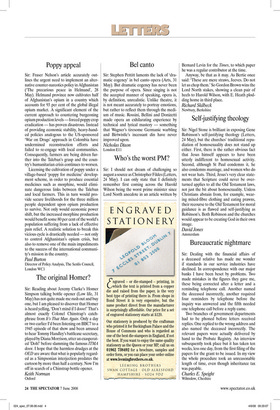Poppy appeal
Sir: Fraser Nelson’s article accurately outlines the urgent need to implement an alternative counter-narcotics policy in Afghanistan (‘The precarious peace in Helmand’, 28 May). Helmand province now cultivates half of Afghanistan’s opium in a country which accounts for 93 per cent of the global illegal opium market. A significant element of the current approach to countering burgeoning opium production levels — forced poppy crop eradication — has proven disastrous. Instead of providing economic stability, heavy-handed policies analogous to the US-sponsored ‘War on Drugs’ approach in Colombia have undermined reconstruction efforts and failed to re-engage with local communities. Consequently, farmers are being driven further into the Taleban’s grasp and the country’s humanitarian crisis continues to worsen.
Licensing the cultivation of poppy under a village-based ‘poppy for medicine’ development scheme, in order to produce essential medicines such as morphine, would eliminate dangerous links between the Taleban and local farmers. This in turn would provide secure livelihoods for the three million people dependent upon opium production to survive. Not only would economic power shift, but the increased morphine production would benefit some 80 per cent of the world’s population suffering from a lack of effective pain relief. A realistic solution to break this vicious cycle is drastically needed — not only to control Afghanistan’s opium crisis, but also to remove one of the main impediments to the success of the international community’s mission in the country.
Paul Burton
Director of Policy Analysis, The Senlis Council, London WC1










































































 Previous page
Previous page